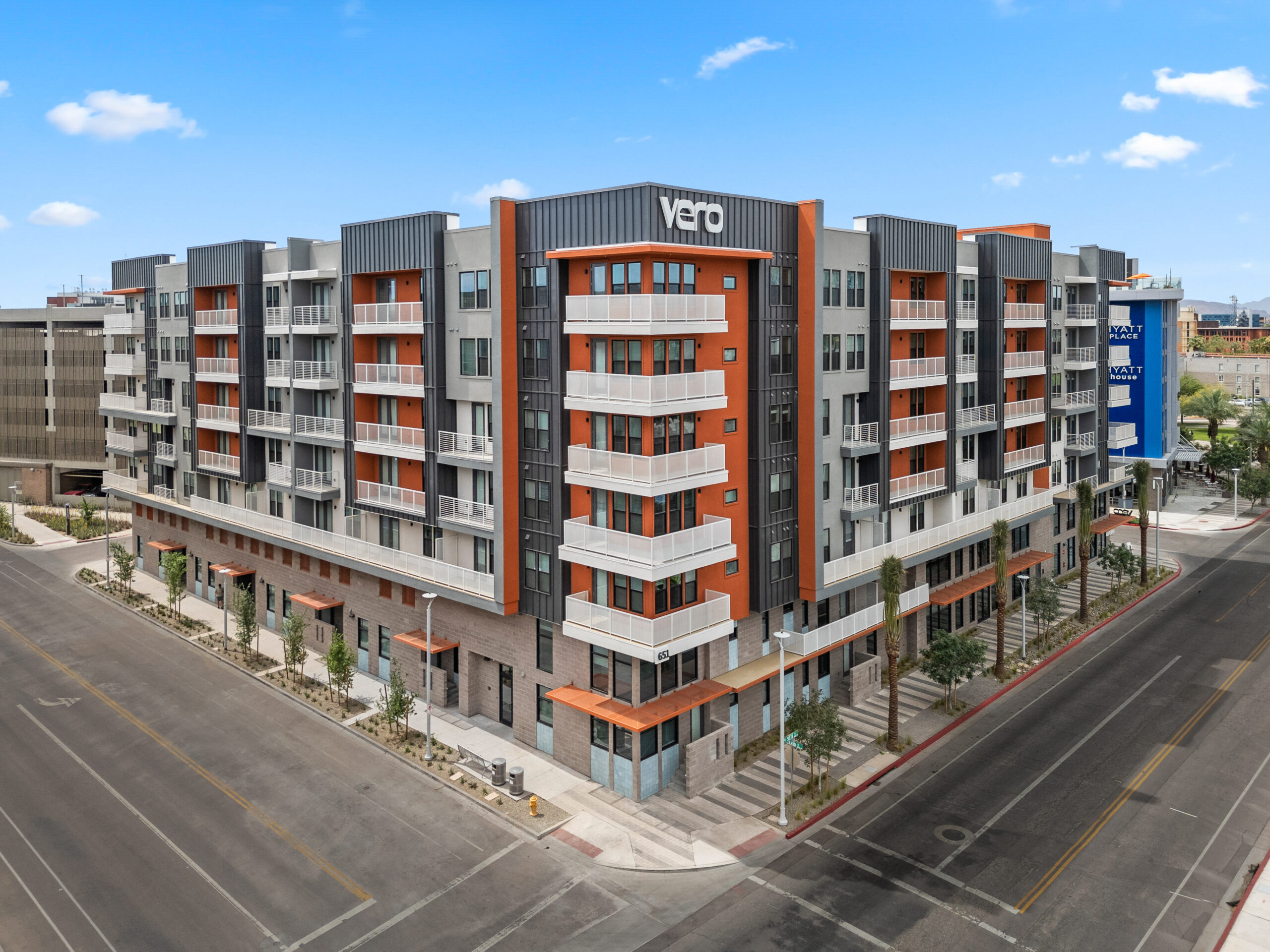
By Charlie Popeck, President of Green Ideas Building Science Consultants
The “Vero” multi-family project at Novus Innovation Corridor in Tempe, Arizona recently received LEED SILVER level certification from the U.S. Green Building Council and serves as a shining example of what can be accomplished with an owner team dedicated to sustainable, high-performance design and construction methods.
Green Ideas Building Science Consultants’ President Charlie Popeck was asked to spearhead the LEED certification process for Vero by Transwestern Development Company, the developer of the 200-unit multi-family project. Green Ideas was immediately excited to join the project team because of Transwestern’s commitment to LEED Silver level certification and the highly regarded reputation of the Novus Innovation Corridor.
Green Ideas began by implementing an integrative design process to the project with Wilder Belshaw Architects of Addison, Texas. The process included development of detailed energy and water use budgets which enabled the project team to focus on elements of the design that would deliver the most energy and water efficient project possible while achieving LEED Silver level certification (required for all Novus projects) and providing a healthy indoor environment for building occupants. By implementing Green Ideas’ integrative design process early-on, the 144,565 square foot, seven story apartment project was able to achieve LEED for New Construction (LEED-NC) points in all the following LEED categories.
Location & Transportation Category (12 of 16 possible points achieved)
Twelve points were earned in this category that encourages projects to be located within a LEED for Neighborhood Development (LEED-ND) certified community. The Novus Innovation Corridor development achieved LEED-ND certification in April of 2021, so the project automatically earned 12 points. LEED-ND seeks to create sustainable communities by limiting single occupancy vehicle use and providing easy access to mass transit and local amenities. Bicycle storage facilities and preferred parking for green vehicles were provided, along with reducing the project’s parking footprint. By locating the building within the centrally located Novus / ASU campus many of the Location & Transportation category LEED points were automatically earned. When combined, these strategies provided an extremely usable building that is easily accessible, while saving fuel and contributing to a healthy macro environment.
Sustainable Sites Category (6 of 10 possible points achieved)
The project earned six points in this category for developing a sustainable site which includes conducting a site assessment prior to construction and providing extensive rainwater management strategies around the building. Points were also earned by mitigating the urban heat island effect through specification of reflective roof surfaces and installing permeable hardscape elements.
Water Efficiency Category (5 of 11 possible points achieved)
Low-flow plumbing fixtures that are WaterSense certified were specified and installed throughout the project, reducing potable water for domestic use by over 38%. Potable water used for irrigation purposes was reduced by 50%, and advanced water metering strategies were employed to provide facility management with the capability to measure water used for different building operation purposes, because…using one of my favorite quotes…”what is measured can be managed and improved”. Metering will enable the operation and maintenance staff to identify and improve upon water reduction strategies into the future.
Energy & Atmosphere Category (16 of 33 possible points achieved)
Sixteen of the 33 points available were earned in this all-important category for providing energy cost savings above the ASHRAE 90.1-2010 energy baseline standard by 36%! Energy use reduction was achieved through maximizing orientation of the building, designing an energy efficient building envelope and then specifying efficient mechanical systems. These strategies fed into the computerized energy model that Green Ideas completed to confirm the building’s future energy use. Other targeted credits include Enhanced Commissioning of the building’s mechanical systems which ensures the owner that all energy and water-using systems were installed, calibrated, and are operating according to the Mechanical Engineer’s specifications. The Enhanced Commissioning credit also includes a design phase review of the mechanical system design and a post-occupancy re-commissioning procedure at ten months after occupancy to give the owner confidence that the building’s systems continue to operate at peak efficiency before the construction warranty expires at the twelve-month point.
Materials & Resources Category (2 of 13 possible points achieved)
Building products that have Environmental Product Declarations (EPDs) and Health Product Declarations (HPDs) available were specified throughout the building. EPDs and HPDs are essentially a report card for a building product, which gives confidence to specifiers about product environmental attributes such as recycled content and the amount of volatile organic compounds (VOCs) contained within a building product. These material strategies will ensure that the project has minimal impact on the environment. The General Contractor also implemented a construction waste management program for the project, which aims to divert construction waste from landfills.
Indoor Environmental Quality Category (5 of 16 possible points achieved)
This very important category is focused on providing additional outside air to the interior portions of the building to improve indoor air quality (IAQ) and specifying low-emitting materials that contain a very low or zero amount of VOCs or formaldehyde, all contributing to the building’s superior IAQ. The General Contractor also developed and followed an Indoor Air Quality Management Plan during the construction phase to minimize contaminants that would have been brought into the building during construction, as well as performing a building flush-out before occupancy to remove any lingering jobsite pollutants. These indoor environmental quality strategies combined to provide the healthiest possible living environment for occupants of the building.
Innovation Category (4 of 6 possible points achieved)
Points within the Innovation category are made available to project teams for either exceeding the requirements of an existing LEED credit or implementing truly high-performance building or operating strategies that do not exist as a LEED credit. Vero earned four of six possible points by developing a healthy Green Janitorial Program which utilizes non-toxic cleaning fluids and other janitorial materials. An additional point was earned by exceeding the requirements of the Heat Island Reduction credit and another by specifying lighting with reduced mercury content. These strategies resulted in raising the innovation level of this signature multi-family building.
Regional Priority Category (2 of 4 possible points achieved)
Other “extra credit” points are available in this LEED category for exceeding a U.S. Green Building Council pre-defined threshold for existing credits that are deemed to be very important to the region where the project is located. The Regional Priority credits that were targeted and achieved by Vero include Optimize Energy Performance (threshold of 10 points), and further reducing the urban heat island effect by implementing reflective roof and hardscape surfaces (threshold of 2 points).
Application of an Integrative Design Process and a motivated owner enabled the project to earn the coveted LEED Silver level of certification on November 18, 2024. The project earned 52 out of a possible 110 points and earned the distinction of being the second LEED Silver level certified multi-family project within the Novus Innovation Corridor campus! Green Ideas Building Science Consultants is proud to have worked with such a dedicated team and we truly appreciate the Transwestern Development Company’s commitment to sustainable, high-performance design, construction and operation for their facilities. The end result is an incredibility energy, water and materials efficient building that is the healthiest that it can be. The Vero project is a hallmark structure that will continue to serve Arizona State University, the Novus Innovation Corridor and the Tempe, Arizona community at large for many years into the future.
About Green Ideas® Building Science Consultants
Charlie Popeck is President and CEO of Green Ideas, a full-service building science consulting firm offering 3D energy and daylight modeling, building commissioning, and world-class LEED certification services. The firm is designated as a LEED Proven Provider by Green Business Certification Inc. and is a certified B Corporation. Its clients are building owners, architects, engineers, contractors, real estate developers, facility managers, and corporate entities wishing to establish business advantages through high-performance building practices. With a vision as bold as the results they achieve, Green Ideas is dedicated to transforming the market by promoting building science through a “triple bottom line” approach to business operations.


